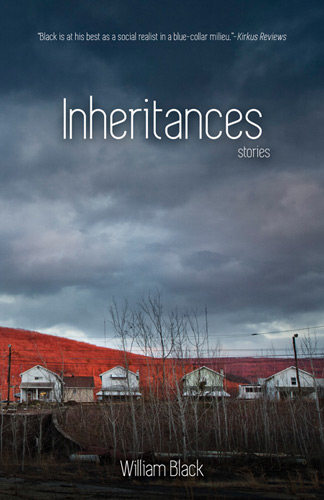William Black’s stunning and stirring debut collection consists of twelve short stories set in Appalachia’s Northeastern Pennsylvania, where rugged hills and peaceful valleys landscape both the terrain and the soul. The evocative language in which Inheritances is written mirrors the highs and lows of his characters’ emotions as Black leads us into and immerses us in their lives. Each story’s intriguing beginning and thought-provoking ending make this collection a keeper—one you’ll find yourself reaching for every time you need a dose of the valor and courage his characters demonstrate. William Black’s stunning and stirring debut collection consists of twelve short stories set in Appalachia’s Northeastern Pennsylvania, where rugged hills and peaceful valleys landscape both the terrain and the soul. The evocative language in which Inheritances is written mirrors the highs and lows of his characters’ emotions as Black leads us into and immerses us in their lives. Each story’s intriguing beginning and thought-provoking ending make this collection a keeper—one you’ll find yourself reaching for every time you need a dose of the valor and courage his characters demonstrate.
In the collection’s first story “The Pleasure Dome,” two young boys beleaguer their father until he concedes and takes them to what they perceive is a mystical site—the Pleasure Dome:
From the deepest spot in the valley, a pastel glow that lit the hazy air, coral pink, aquamarine, other worldly colors hanging like aurora borealis above the black trees. Spotlights cut through the colors, sending white beams into the sky, illuminating the undersides of the clouds, swiveling, crossing each other, separating again.
“The fall of man,” our father had told us about the Pleasure Dome, because he knew how we loved the lights. “The beginning of the end of things.”
After their visit to the Pleasure Dome, the boys remain in awe, though now in a worldly-wise fashion far beyond their years.
“Susquehanna, 1960” is simultaneously heartbreaking and inspiring. Black tells the fictional story of three coal miners—survivors of the historic Knox Mine disaster that occurred in January a year earlier when the swollen Susquehanna River collapsed into the mine and killed a dozen men—who raft upriver in an attempt to prove to the river, the community, and more importantly, to themselves, that the Susquehanna has not beaten them.
Each of the stories in Black’s collection plays against expectations, revealing the depth of his characters, perhaps even plumbing new depths in his readers. Such is the case with “Wildcats,” a story of a young man and his three friends who struggle with the challenges of adulthood when their hometown farms are turned into oil fields, then left looking like ghost towns after the oil company has taken the land and, with it, all its residents had to offer. From the first paragraph, we’re drawn deep into that devastating world of suffering and steadfastness:
No one ever thinks about the oil that’s not under here, but there are reminders of it everywhere: the blue and white pumps they set up that spring, the barracks the oil men lived in, the silver mobile homes they used as supervising stations now rusting in the corners of overgrown fields. There are other reminders, too. I still walk with a limp. After working all day my knee stiffens and aches like the pain is new, and no matter how tired I am, it will keep me from sleeping.
It’s impossible for me to choose a favorite from among this excellent collection, but if pressed, I’d tell you that “Architecture” ranks among the top. Exceptional junior-attorney Mark marries beautiful art-major Elizabeth, and they have two children. Elizabeth raises the kids and supports Mark’s climb to partnership in the firm, putting her own career opportunities aside in the process. When the children are raised and bearing children of their own, Mark retires, and the two spend leisurely hours walking the streets, where Elizabeth enlightens Mark about the city’s history and architecture. It is during one of these walks that the two encounter two women, “unknempt, unshowered, their hair greasy and matted. Homeless, one thinks, everyone thinks.” The lives of these two women intersect with those of Mark and Elizabeth, contrasting and juxtaposing in ways that leave the reader breathlessly turning pages, devouring, until the final paragraph, where the inevitable surprises us with its poignancy.
William Black proves he is a master at setting a scene that draws you into the story, and “Intruder” is but one fine example of this truth. “Intruder” relates the story of Daniel and his family coming home to face a most unsettling event—a home break-in.
Later, he would remember this ominously: his shoulder against the door, dislodging it from its frame, and a shotgun blast rose suddenly out of the valley. It came from nearby, just below the ridge perhaps, where he and Evan sometimes saw wild turkeys. All around them, birds lifted up from the trees, the hundreds of wings like laundry ruffling and snapping in the wind. The percussion echoed between the hills. The house had been ransacked—that was the word that came to mind.
As he puts his house—his home—back in order, Daniel gleans clues as to who the intruders were, and what he learns about the trespassers disturbs and changes him more than the unnerving break-in ever could.
Seven more equally compelling stories round out Inheritances. Make a space on your bookshelf for this one, preferably on a shelf within arm’s reach, as it’s a short-story collection you won’t want to part with.





